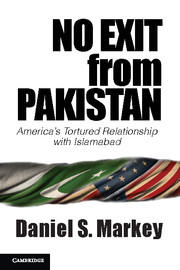4 - U-Turn to Drift
U.S.-Pakistan Relations during the Musharraf Era
Published online by Cambridge University Press: 05 June 2014
Summary
Almost exactly ten years after the 9/11 attacks, Admiral Michael Mullen, chairman of the Joint Chiefs of Staff, testified before the U.S. Congress that the Haqqani network – a branch of the Afghan Taliban based in Pakistan's tribal areas – operated as a “veritable arm” of the Pakistani state. The chairman's claim came in the aftermath of several high-profile Haqqani-orchestrated attacks inside Afghanistan, including one in which armed gunmen briefly managed to fire into the U.S. Embassy grounds from a nearby Kabul construction site.
None of these attacks threatened to dislodge NATO's International Security Assistance Force (ISAF) from Afghanistan in a military sense. Even so, such violence in the heart of heavily fortified Kabul cast new doubts about whether the United States had any serious prospect of winning the war. Public skepticism was already on the rise. By late October 2011, 63 percent of Americans opposed the U.S. war in Afghanistan.
By his testimony, Mullen essentially accused Pakistan of being a state sponsor of terrorism. Given its ties to the Haqqanis, Pakistan’s Inter-Services Intelligence directorate (ISI) had American blood on its hands. The senior-most U.S. military officer spoke before Congress sitting shoulder-to-shoulder with the secretary of defense, Leon Panetta. Although Mullen had made similar remarks to the Pakistani media months earlier, the formal Capitol Hill testimony carried greater political weight in Washington and Islamabad. In both instances, his damning conclusion came as a shock to many Pakistanis who had considered Mullen a “pro-Pakistani” voice among Obama’s top officials. Mullen earned this distinction from spending long hours cultivating ties with Pakistan’s army chief, General Ashfaq Kayani. Like many officers, Mullen placed a great deal of stock in the notion that personal connections with foreign officers build more effective state-to-state relationships. If Pakistan’s generals had a friend in Washington, he was it.
- Type
- Chapter
- Information
- No Exit from PakistanAmerica's Tortured Relationship with Islamabad, pp. 105 - 135Publisher: Cambridge University PressPrint publication year: 2013



